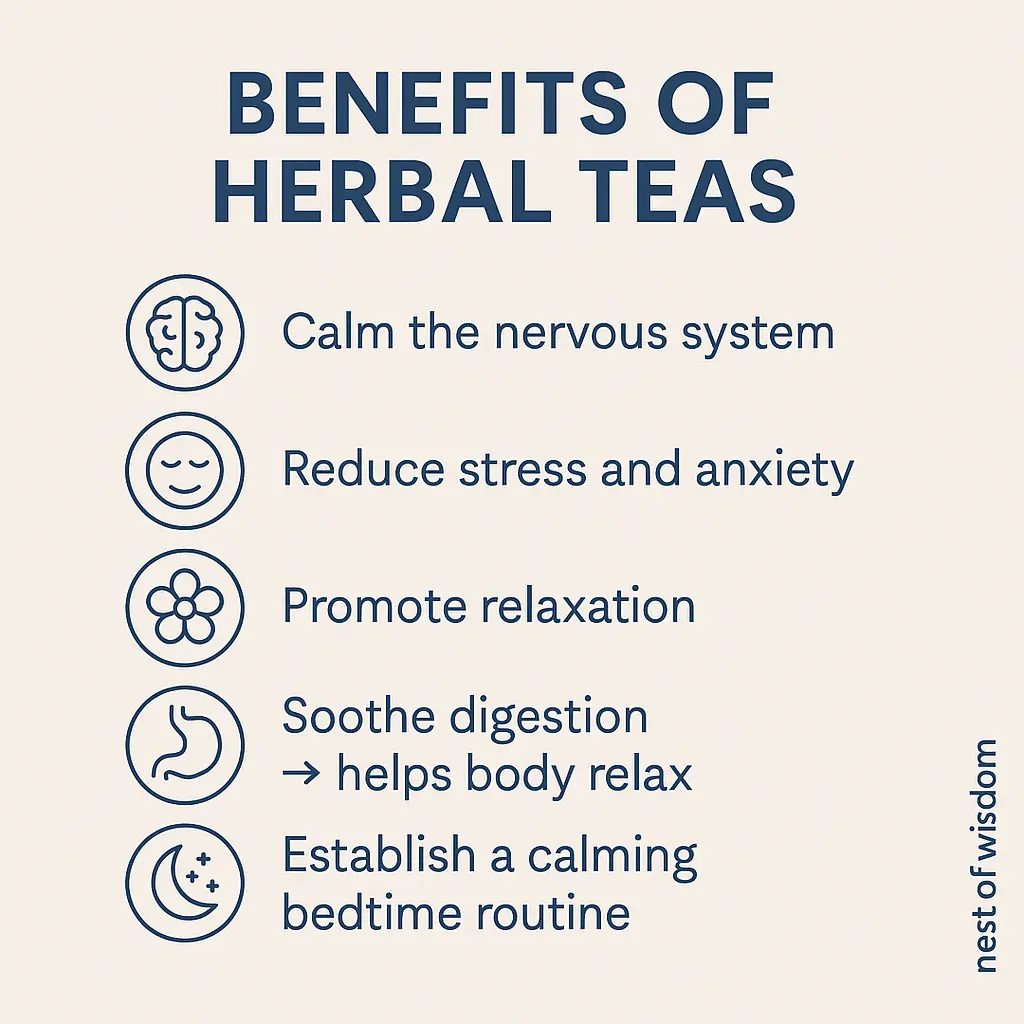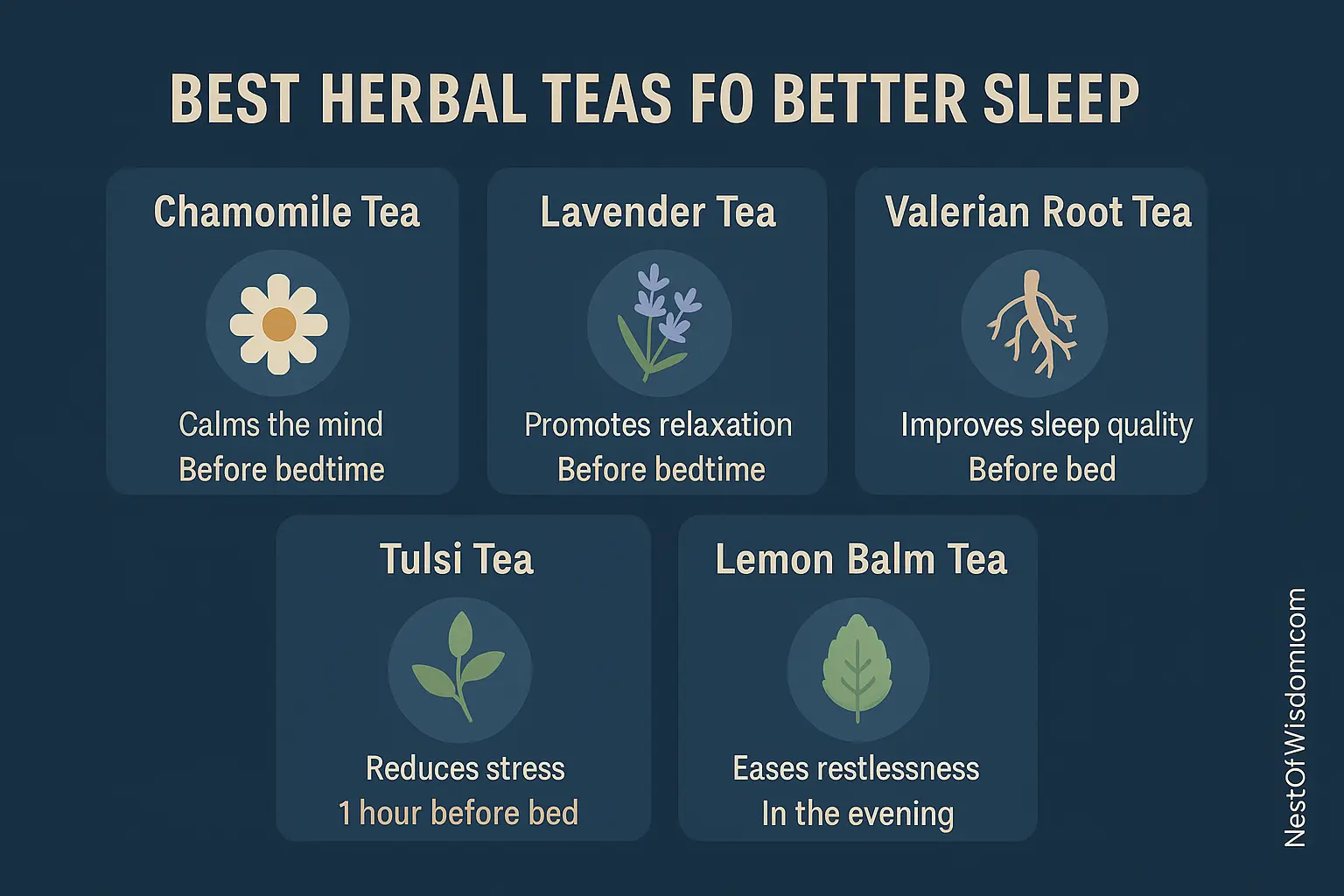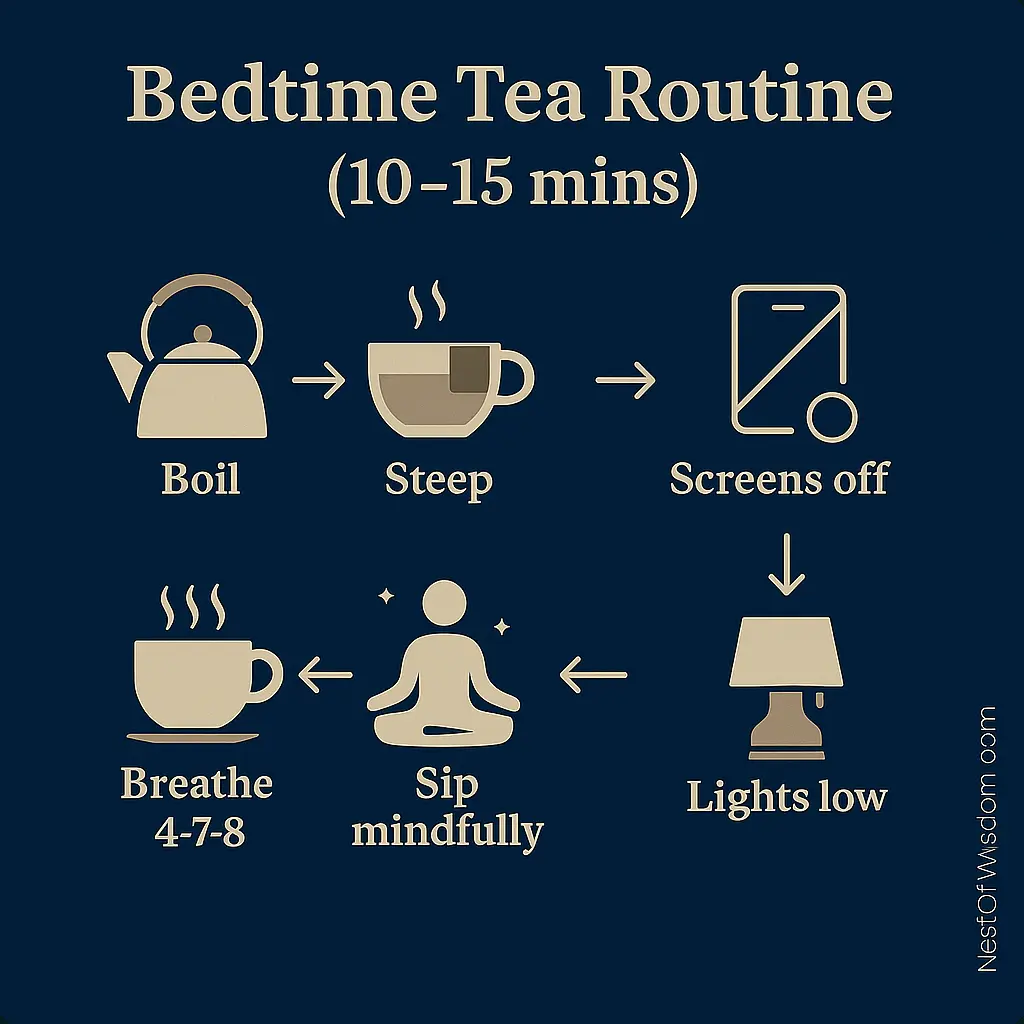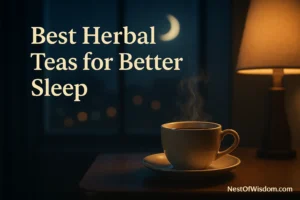Table of Contents
- Introduction
- How Herbal Teas Help with Sleep
- History & Cultural Roots
- 10 Best Herbal Teas for Better Sleep (with Tamil names)
- Two Optional Mentions (Bonus)
- The Science Behind Sleep Teas
- Brewing & Timing Tips
- Bedtime Tea Routine (10–15 mins)
- Lifestyle Integration That Actually Works
- Real-Life Story: Meera’s Sleep Turnaround
- Who Should Be Careful
- FAQs
- Conclusion
Introduction
Best Herbal Teas for Better Sleep are gentle, nightly signals telling your nervous system it’s safe to relax. If late screens, stress, or heavy dinners keep you awake, a warm cup of the Best Herbal Teas for Better Sleep can anchor a simple, drug-free ritual.
Across cultures, families have long brewed chamomile, lavender, tulsi, lemon balm, and valerian before bed. Modern guidance echoes tradition: the Sleep Foundation notes that certain herbal teas support relaxation and sleep quality when used consistently.
This expanded guide blends tradition and science. You’ll find Tamil names, precise brewing tips, inline research citations, a 10–15 minute routine, lifestyle pairings, and a relatable story—so you can personalize the Best Herbal Teas for Better Sleep into a soothing nightly habit.
How Herbal Teas Help with Sleep



Herbal infusions work via chemistry and ritual. Warmth relaxes muscles, aroma calms the limbic system, and repetition teaches your brain to expect sleep.
- Calm the nervous system: Many herbs gently support GABAergic tone—the body’s “rest & digest” pathway.
- Reduce stress & anxiety: Steam, scent, and slow sipping lower cognitive arousal and help a racing mind settle.
- Promote relaxation: Chamomile (apigenin) and lavender (linalool) are linked to soothing effects and better sleep quality (Sleep Foundation).
- Soothe digestion: A calmer gut reduces restlessness at night.
- Anchor a bedtime cue: A consistent cup of the Best Herbal Teas for Better Sleep tells your body that night mode has begun.
Unlike caffeine, these teas pair beautifully with a daily sleep routine—dim light, slower breath, and quiet time.
History & Cultural Roots
Herbal sleep teas aren’t a fad; they’re a thread through human history. In Tamil homes, a warm tulsi kashayam after dusk still signals bedtime calm. In Ayurveda and Siddha traditions, botanicals were combined for dosha balance and restorative rest.
In the Mediterranean, chamomile soothed nerves; Greek and Roman writers mentioned calming infusions; medieval monasteries tended herb gardens to help the sleepless. East Asian families brewed chrysanthemum to “cool heat” that can sabotage sleep.
These threads converge on the same insight: soothe the senses and the mind will follow. That’s why the Best Herbal Teas for Better Sleep feel instinctive—even before you read modern research.
10 Best Herbal Teas for Better Sleep (with Tamil names)


1) Chamomile (சாமமில் டீ)
Chamomile contains apigenin, linked with relaxation and improved sleep quality. The NCCIH overview summarizes safety and traditional use. Brew 5–7 minutes, covered, and sip 30 minutes before bed. A classic anchor among the Best Herbal Teas for Better Sleep.
2) Lavender (லாவெண்டர் டீ)
Lavender’s linalool helps ease anxious arousal. Pair with slow exhalations (see Harvard link below) and dim light. Many blend lavender with chamomile for a soft, floral cup in the family of Best Herbal Teas for Better Sleep.
3) Valerian Root (வாலேரியன் ரூட் டீ)
Valerian may reduce sleep latency for some. A review summarizes evidence for insomnia support (PubMed). Steep 7–10 minutes; avoid combining with sedatives.
4) Tulsi / Holy Basil (துளசி டீ)
An adaptogen in Ayurveda, tulsi supports stress resilience and a calmer evening mood. Gentle peppery-sweet flavor; lovely with a squeeze of lemon after steeping.
5) Lemon Balm (லெமன் பாலம் டீ)
Lemon balm’s rosmarinic acid supports GABA pathways. Great if restlessness and digestive tension disturb your sleep. Part of many readers’ Best Herbal Teas for Better Sleep rotation.
6) Passionflower
Traditionally used for nervousness and sleeplessness; may modulate GABA. Tastes slightly grassy; blends beautifully with chamomile or lemon balm.
7) Peppermint
Cooling, aromatic, and digestive-friendly. Naturally caffeine-free and helpful after heavier dinners that might otherwise delay sleep.
8) Rose
Fragrant and heart-softening; pairs well with gratitude journaling before bed. Blend with tulsi or lavender for a peaceful cup within the Best Herbal Teas for Better Sleep theme.
9) Chrysanthemum
Popular in East Asia to “cool heat,” ease irritability, and reduce eye strain—useful if you run warm or overuse screens at night.
10) Lemongrass
Citrusy yet grounding, lemongrass supports digestion and sets a serene pre-sleep mood when brewed gently and sipped in low light.
Two Optional Mentions (Bonus)
11) Skullcap (ஸ்கல்காப் டீ)
Used in Western herbalism for nervous tension. Start low. Discuss with a professional if you use medications. Consider as an optional member of the Best Herbal Teas for Better Sleep toolkit.
12) Licorice Root (அதிமதுரம் டீ)
Sweet, throat-soothing, and calming—use occasionally. Not a fit for people with hypertension unless supervised. Another optional add-on to the Best Herbal Teas for Better Sleep list.
The Science Behind Sleep Teas
The Best Herbal Teas for Better Sleep make sense biochemically and behaviorally. Tradition aligns with modern evidence when you look at active compounds and nightly habits.
- Chamomile → Apigenin: Linked with sedation and reduced anxiety; summarized by NCCIH.
- Lavender → Linalool: Aroma supports calming and lower arousal (noted by the Sleep Foundation).
- Valerian → Valerenic acids: May influence GABA receptors and sleep latency (PubMed).
- Lemon Balm → Rosmarinic acid: Inhibits GABA breakdown, sustaining relaxation signals (noted across clinical monographs).
Ritual matters, too. Slow exhalations reinforce melatonin’s nightly signal. For breathwork technique, see Harvard Health. Combine breath, dim light, and a steady cup to get the most from the Best Herbal Teas for Better Sleep.
Brewing & Timing Tips
- Timing: Sip the Best Herbal Teas for Better Sleep 30–60 minutes before lights-out; valerian may suit 60 minutes.
- Steep smart: Flowers (chamomile, lavender) 5–7 mins covered; leaves (lemon balm, tulsi) 5–7 mins; roots (valerian) 7–10 mins.
- Water quality: Use fresh, just-off-boil water; avoid repeatedly re-boiled water.
- Add-ins: A drizzle of honey after steeping, a squeeze of lemon, or a pinch of cardamom for a soothing finish.
- Consistency: One simple ritual most nights beats a complicated routine once a week.
Bedtime Tea Routine (10–15 mins)


- Boil: Heat fresh water.
- Steep: Add botanicals; keep the cup covered.
- Screens off: 30–60 minutes before bed.
- Breathe 4-7-8: Inhale 4, hold 7, exhale 8—repeat ×4 (method overview via Harvard Health).
- Sip mindfully: Slow, quiet sips; lengthen your exhale.
- Lights low: Warm, dim light tells your brain it’s sleep time.
Lifestyle Integration That Actually Works



- Gentle movement: Five minutes of restorative stretches tells the body to soften.
- Gratitude journaling: Note three good things to shift the brain from problem-solving to appreciation.
- Soundscape: Soft instrumental or a short body-scan pairs well with the Best Herbal Teas for Better Sleep.
- Environment: Keep the bedroom cool and dark; add greenery from indoor plants for positive energy.
- Daytime habits: Reduce late heavy meals; add calming herbal drinks for blood sugar earlier in the day.
- Mind–body add-ons: Pair your cup with yoga poses for stress relief or 5 minutes of yoga nidra.
Pick one or two of the Best Herbal Teas for Better Sleep, keep your routine at the same time nightly, and reassess after two weeks.
Real-Life Story: Meera’s Sleep Turnaround
Meera, a 36-year-old professional in Chennai, slept late, scrolled later, and woke foggy. She committed to a realistic plan: chamomile tea at 9:15 pm, phone on airplane mode at 9:30, one page of gratitude journaling, and four rounds of 4-7-8 breathing. Week one felt mild; by week three she fell asleep ~20 minutes faster and woke less to urinate by finishing her tea earlier.
On late-meeting days she swapped chamomile for lemon balm and did a two-minute shoulder stretch. Her family noticed calmer evenings and brighter mornings. That’s the power of the Best Herbal Teas for Better Sleep—not magic, but a compassionate, repeatable cue that teaches the body to rest again.
Who Should Be Careful
- Allergies: Chamomile belongs to Asteraceae (ragweed relatives). Avoid if allergic (details in the NCCIH overview).
- Pregnancy & lactation: Seek medical advice before using concentrated herbs or valerian.
- Medications: Herbs may interact with sedatives, antidepressants, blood thinners, thyroid and diabetes meds—confirm with your clinician.
- Valerian caution: Evidence is mixed; avoid with alcohol or sedatives; consider intermittent use (PubMed).
- Licorice root: Not suitable for hypertension unless supervised; avoid long-term daily use.
- Children: Use only mild teas like diluted chamomile under pediatric guidance.
FAQs
How soon before bed should I drink these teas?
Most people do well when they drink the Best Herbal Teas for Better Sleep 30–60 minutes before lights-out. If you wake to urinate, finish earlier and sip slowly (see routine above).
Can I blend herbs together?
Yes. Try chamomile + lavender, lemon balm + tulsi, or valerian + chamomile. Start simple to observe how each herb affects you before creating blends in your set of Best Herbal Teas for Better Sleep.
Is valerian safe long-term?
Short-term valerian appears reasonable for many adults, but long-term data are limited. Avoid with sedatives and seek professional guidance if you take medications (PubMed).
Are these teas safe for children?
Always check with a pediatrician. Mild, diluted chamomile is the typical first choice. Avoid strong herbs like valerian for kids even when exploring the Best Herbal Teas for Better Sleep.
What else helps besides tea?
Consistent bed/wake times, a cool dark room, earlier dinners, light stretching, and breathwork. Harvard’s overview of relaxation breathing is a useful primer (Harvard Health).
Conclusion
The Best Herbal Teas for Better Sleep are cozy, effective, and timeless. Choose one or two, sip them at the same evening window, and pair them with dim light and slow breathing. Within a few weeks your body learns to relax on cue—and sleep becomes steadier, deeper, and sweeter.
For whole-day balance that supports the Best Herbal Teas for Better Sleep, explore our Daily Habits for Better Sleep, calming Yoga Poses for Stress Relief, Herbal Drinks for Blood Sugar, and Positive Indoor Plants guides.
Nest of Wisdom Insights is a dedicated editorial team focused on sharing timeless wisdom, natural healing remedies, spiritual practices, and practical life strategies. Our mission is to empower readers with trustworthy, well-researched guidance rooted in both Tamil culture and modern science.
இயற்கை வாழ்வு மற்றும் ஆன்மிகம் சார்ந்த அறிவு அனைவருக்கும் பயனளிக்க வேண்டும் என்பதே எங்கள் நோக்கம்.
- Nest of Wisdom Insightshttps://nestofwisdom.com/author/nestofwisdom/
- Nest of Wisdom Insightshttps://nestofwisdom.com/author/nestofwisdom/
- Nest of Wisdom Insightshttps://nestofwisdom.com/author/nestofwisdom/
- Nest of Wisdom Insightshttps://nestofwisdom.com/author/nestofwisdom/
Related posts
Today's pick
Recent Posts
- Internal Linking Strategy for Blogs: A Practical, Human-Centered Playbook
- AI in the Automotive Industry: A Practical, Human-Centered Guide
- Cloud Tools for Small Businesses and Freelancers: The Complete Guide
- Generative AI in Business: Real-World Use Cases, Benefits & Risks
- 7 Life-Changing Daily Habits for Weight Loss Without Dieting


